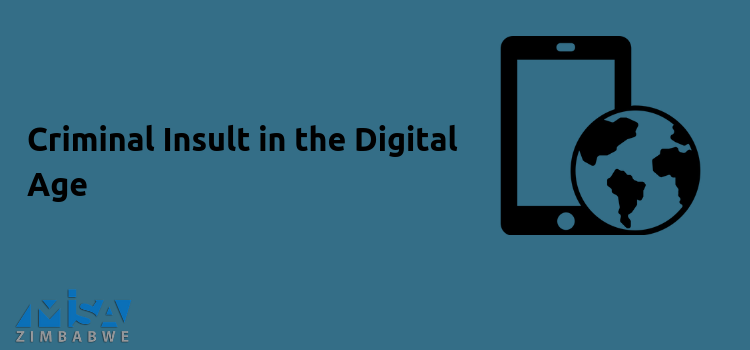A Harare magistrate recently convicted a man of criminal insult. The charge of criminal insult against Shadaya arose after he retweeted a Tweet sent from an account purportedly belonging to Zimbabwe Electoral Commission chairperson Priscilla Chigumba.
Once Chigumba was made aware of Shadaya’s retweet, she made a report to the police claiming that the retweet impaired her dignity. Accordingly, Shadaya was charged and eventually found guilty of contravening section 95 of the Criminal Law and Codification Act.
Reports indicate that Shadaya is working on an appeal against the conviction. Since the matter is still before the courts, this write-up will not concern itself with the correctness or lack thereof of Shadaya’s conviction.
This brief write-up will, however, focus on criminal insult and whether this statutory offence should have a place in Zimbabwe’s cyberlaw framework. Cyber laws are drafted with the primary aim of criminalising cybercriminal activities.
Computers as enablers of crime
However, the issue is that cybercrime is widely defined to include any crime that is carried out with the aid of a computer or the Internet. This wide definition goes beyond the new criminal activities that only became possible after the introduction of computers and the Internet, for example, hacking.
The definition draws in criminal activities that existed before the invention of computers and the creation of the Internet. In other words, this group of criminal activities is not completely new but has just taken a new form facilitated by the existence of computers and the Internet.
Shadaya’s offence was quickly labelled as a cybercrime in local media and rightly so. However, anyone will agree that defaming another person’s character has always been an offence, even before the existence of social media platforms such as Facebook and Twitter or instant messaging services such as WhatsApp.
Other people went as far as saying that Shadaya was convicted over a “simple retweet.” Again, this is an inaccurate description of events. In the past, when a handwritten letter included a defamatory statement, the author of the letter was not arrested for writing the letter but for the defamatory elements found in that letter.
The same goes for the sending of defamatory statements over social media and instant messaging tools. It is the content and not the method of authoring and sharing the offensive material that is at issue.
Common law offences should remain just that
Concerns were raised about making insult a part of the statutory law because it meant that the State could now intervene and prosecute on behalf of an individual alleging infringement of their dignity. This is respectfully, an excessive use of State power because the nature of these offences requires that the offended party receive compensation for the injury suffered.
However, this compensation does not take place in criminal prosecutions, because whatever fines are paid for the offence, are paid to the State and not the victim. If the actual victim wants compensation they will then need to pursue civil litigation to secure the compensation. This makes the process to get compensation actually longer instead of shorter.
Furthermore, there is a need to consider how much these statutory insult laws have in the past, been used to gag free speech and fair criticism of the government in Zimbabwe. The State has no role in prosecuting violations to dignity. That should remain the responsibility of the individual alleging that their dignity was violated.
The State is, therefore, urged to exclude common law offences and laws that are already covered by Zimbabwe’s existing criminal laws from the upcoming cyber laws. This narrow interpretation of cybercrime will ensure that the gazetted cyber laws are not open to the same abuse that we have seen when interpreting presidential insult laws.
//End









